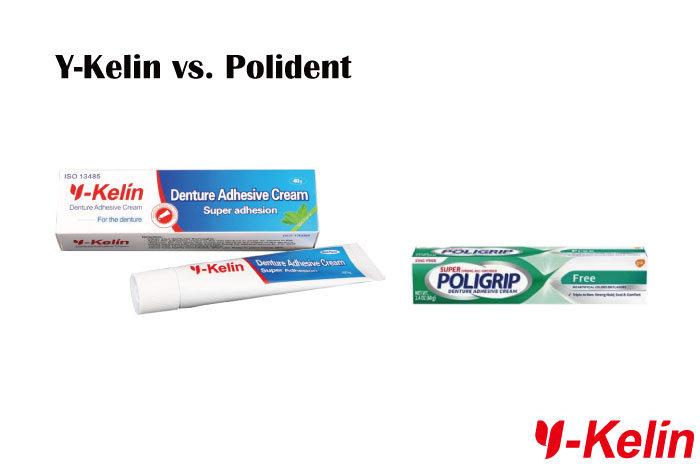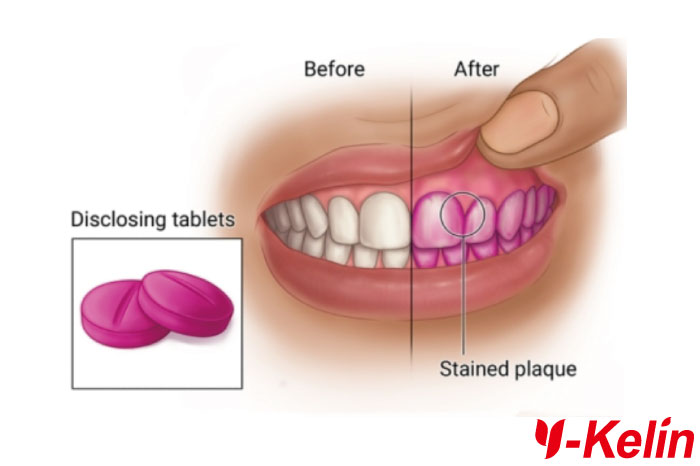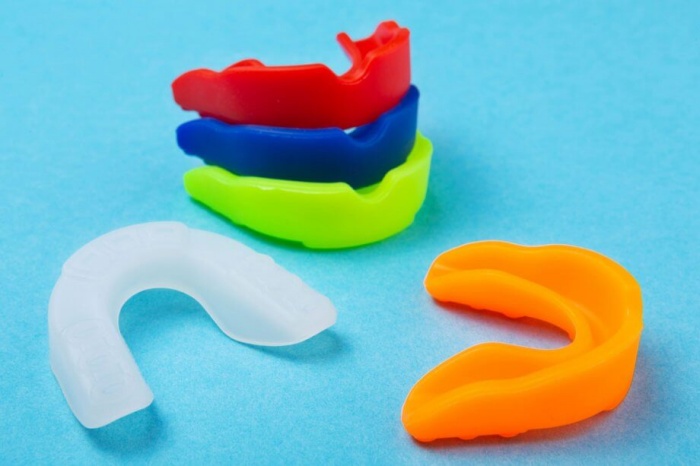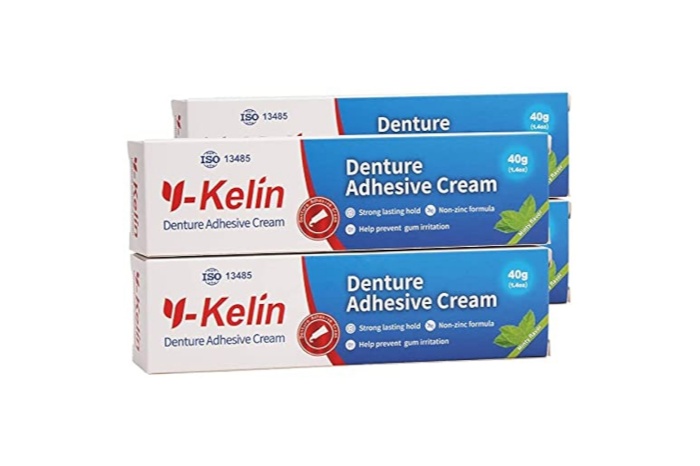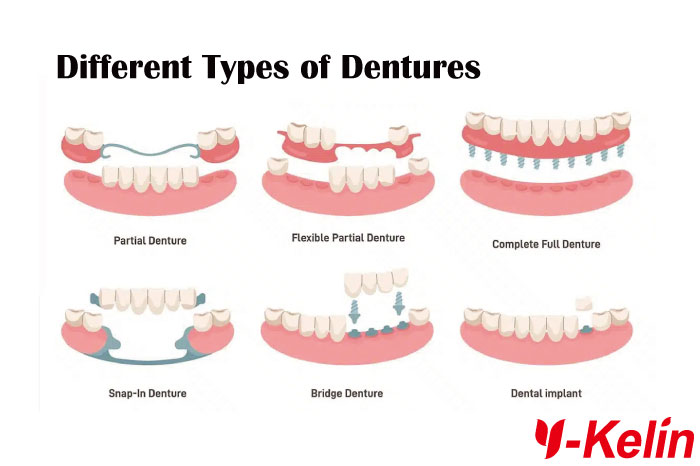
What Are the Different Types of Dentures? A Comprehensive Overview
Published On:
Dentures play a critical role in maintaining oral health when natural teeth are lost. Missing teeth can lead to shifting of remaining teeth, bone loss, and changes in facial structure.
Dentures provide essential support, ensuring your mouth retains its natural shape and function. By replacing lost teeth, dentures also help prevent further oral health complications, such as gum irritation and difficulty chewing or speaking.
Beyond their functional benefits, dentures restore the appearance of a complete smile, boosting confidence and self-esteem. They enable you to eat a wider variety of foods, improving nutrition and overall well-being. Dentures also enhance speech clarity by providing proper support for the lips and cheeks.
Whether it’s for aesthetics or functionality, dentures are vital for improving quality of life and maintaining a healthy, balanced smile.
What Are Full Dentures?
Full dentures are removable dental prosthetics designed to replace an entire set of missing teeth, either on the upper or lower jaw. They are typically made from durable acrylic and fit snugly over the gums.
These dentures are held in place through natural suction or with the help of denture adhesive. This provides a comfortable and functional solution for individuals who have lost all their natural teeth.
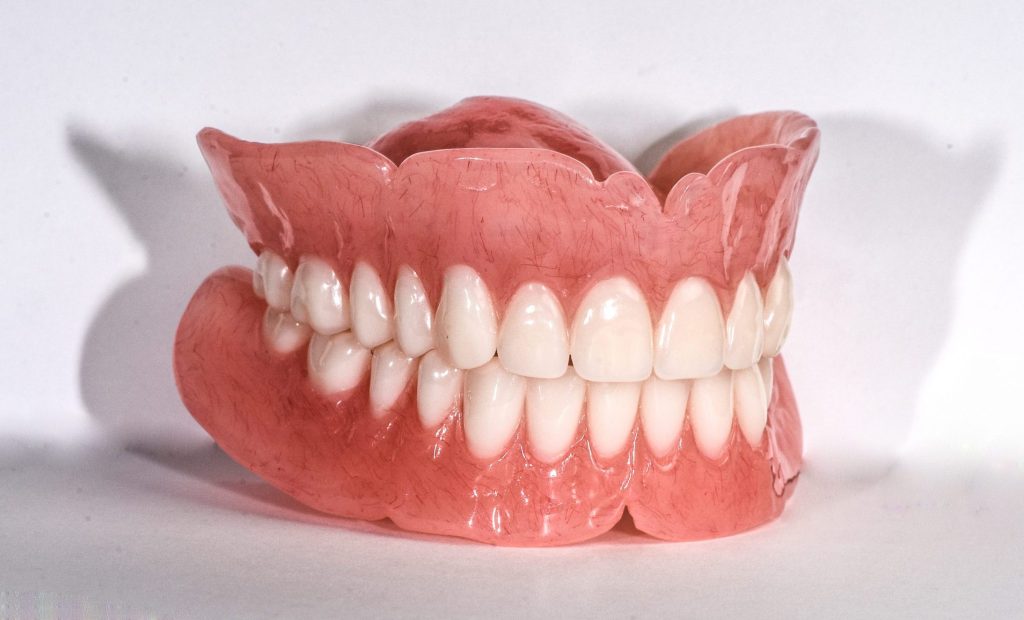
Advantages of Full Dentures
Full dentures restore the ability to eat, speak, and smile with confidence. They support facial muscles, preventing the sunken appearance that often comes with missing teeth.
Affordable and widely accessible, full dentures offer a practical solution for restoring oral health. Modern advancements in denture technology now provide a more natural look and better fit than ever before.
How Full Dentures Are Customized for Your Smile
Each set of full dentures is uniquely crafted to match the individual’s gum contour, jaw structure, and facial features. Dentists take precise measurements and impressions to ensure a comfortable, secure fit.
The teeth in the dentures are shaped, sized, and colored to mimic the patient’s natural teeth. This results in a personalized, natural-looking smile that enhances both appearance and function.
What Are Partial Dentures?
Partial dentures are removable dental appliances designed to replace one or more missing teeth while preserving the remaining natural teeth. They are typically made from a combination of metal and acrylic, or sometimes flexible materials like nylon.
These dentures attach to the natural teeth with clasps or precision attachments, providing a secure and comfortable fit. Partial dentures help restore function and aesthetics, offering a practical solution for those with some healthy teeth left.
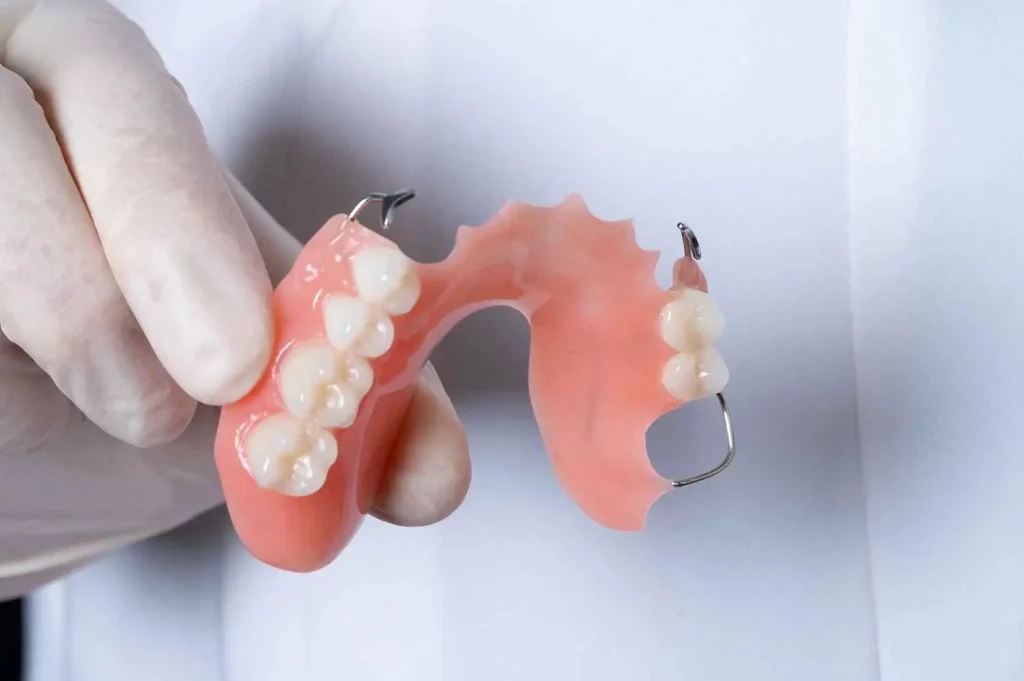
When Are Partial Dentures the Best Option?
Partial dentures are ideal for individuals who have several missing teeth but still retain strong, healthy natural teeth. They are often recommended when dental implants or fixed bridges are not viable due to cost, bone health, or other factors.
This option works well for patients who want to prevent the shifting of their remaining teeth, maintain proper chewing ability, and improve their smile without committing to more invasive procedures.
Key Features and Benefits of Partial Dentures
Partial dentures provide several key benefits. They are cost-effective compared to permanent solutions like implants, and they can be easily removed for cleaning.
Their lightweight design makes them comfortable to wear, while their customized fit ensures they blend seamlessly with natural teeth. Additionally, partial dentures help maintain jaw alignment and prevent wear on the remaining natural teeth.
Overall, they offer a flexible, minimally invasive solution for restoring confidence and oral functionality.
What Are Implant-Supported Dentures?
Implant-supported dentures are a hybrid solution combining traditional dentures with dental implants. Instead of relying on suction or adhesives, these dentures are anchored to titanium implants surgically placed into the jawbone. This integration creates a stable and secure fit, making implant-supported dentures an ideal option for those seeking a more permanent and reliable solution for missing teeth.
These dentures can be fixed or removable, depending on the patient’s preference and oral health needs. They provide excellent functionality and a natural look, restoring confidence and improving quality of life.
The Difference Between Traditional and Implant-Supported Dentures
Traditional dentures rest on the gums and may rely on adhesives to stay in place, while implant-supported dentures are anchored securely to implants. This difference significantly impacts stability and comfort.
Traditional dentures can sometimes shift or slip during eating or speaking, whereas implant-supported dentures remain firmly in place. Additionally, the implants help stimulate the jawbone, preventing bone loss and preserving facial structure over time. This makes implant-supported dentures a more advanced and long-lasting alternative to traditional dentures.
Benefits of Implant-Supported Dentures for Long-Term Comfort
Enhanced Stability: Implant-supported dentures provide a secure fit, eliminating the risk of shifting or slipping.
Improved Functionality: They restore full chewing capability, allowing patients to enjoy a wider variety of foods without concern.
Bone Preservation: The implants stimulate the jawbone, preventing the bone deterioration that often occurs with traditional dentures.
Natural Appearance: The snug fit and customized design create a natural look and feel, boosting confidence.
Durability: With proper care, implant-supported dentures last longer than traditional options, offering a cost-effective long-term solution.
This option combines the best of both worlds—durability and aesthetics—making it a preferred choice for patients seeking a secure and comfortable denture experience.
What Are Snap-In Dentures?
Snap-in dentures, also known as overdentures, are a type of removable denture designed to securely attach to dental implants using special connectors. Unlike traditional dentures, snap-in dentures offer increased stability, reducing the risk of slipping or shifting during daily activities such as eating or speaking.
This innovative design makes them an excellent option for individuals seeking a middle ground between traditional dentures and fully fixed implant-supported solutions.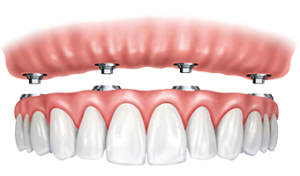
How Snap-In Dentures Work
Snap-in dentures work by anchoring onto dental implants placed in the jawbone. These dentures feature attachments that “snap” into corresponding implants, creating a secure connection. The number of implants required can vary based on the individual’s needs and jawbone health, typically ranging from two to four per arch.
The snap-in mechanism allows for easy removal and reinsertion, providing the convenience of traditional dentures with the added stability of implants. This hybrid approach ensures comfort, functionality, and ease of maintenance.
Pros and Cons of Snap-In Dentures
Pros:
- Improved Stability: Snap-in dentures are far less likely to shift or move compared to traditional options.
- Better Functionality: Patients can enjoy a wider variety of foods without fear of dislodging their dentures.
- Jawbone Stimulation: Like other implant-supported solutions, snap-in dentures help preserve the jawbone and prevent bone loss.
- Customizable Fit: They are tailored to each individual for comfort and a natural appearance.
- Ease of Cleaning: Snap-in dentures can be removed for thorough cleaning, ensuring good oral hygiene.
Cons:
- Cost: Snap-in dentures are more expensive than traditional dentures due to the implants required.
- Surgical Procedure: Implant placement involves surgery, which may not be suitable for all patients.
- Maintenance: While durable, the snap-in attachments may wear over time and require occasional replacement.
- Adjustment Period: Some patients may need time to adapt to the feel of snap-in dentures compared to traditional ones.
Overall, snap-in dentures offer an excellent blend of stability, comfort, and flexibility, making them a popular choice for those seeking a reliable and comfortable denture solution.
What Are Overdentures?
Overdentures are removable dental prosthetics that rest over natural teeth, dental implants, or the gums. They are designed to replace missing teeth while utilizing the support of existing teeth or implants for added stability. Unlike traditional dentures, overdentures provide a more secure and comfortable fit, blending the benefits of removable and fixed dental solutions.
Overdentures are tailored to the patient’s unique needs and oral structure, offering a practical and aesthetically pleasing option for those seeking improved functionality and appearance.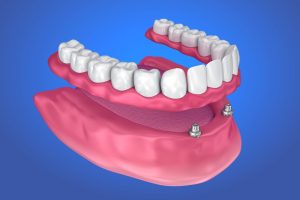
How Overdentures Are Different from Other Types
Overdentures differ from traditional dentures in their ability to use natural teeth or implants for support. This feature makes them more stable and less likely to slip or move. Traditional dentures rely solely on suction or adhesives, which can result in discomfort or instability.
Compared to implant-supported dentures, overdentures provide greater flexibility, as they can be easily removed while still offering the structural support needed for proper chewing and speaking. This hybrid approach makes them a versatile choice for patients with diverse oral health needs.
Key Advantages of Overdentures for Those with Remaining Teeth
Preservation of Natural Teeth: Overdentures utilize existing teeth, which helps maintain jawbone density and provides a more natural feel.
Improved Stability: The support from natural teeth or implants enhances stability, making overdentures more comfortable and functional.
Enhanced Comfort: Overdentures are customized to fit snugly over the gums and teeth, reducing irritation and improving the overall wearing experience.
Ease of Maintenance: Like traditional dentures, overdentures can be removed for thorough cleaning, ensuring optimal oral hygiene.
Cost-Effective Alternative: Compared to full implant-supported dentures, overdentures are often more affordable while still offering many of the same benefits.
Overdentures provide a well-rounded solution for patients with some remaining teeth, delivering enhanced comfort, stability, and oral health while preserving a natural look and feel.
What Are Flexible Dentures?
Flexible dentures are a type of removable dental prosthetic made from soft, lightweight materials such as nylon or thermoplastic resins. Unlike traditional acrylic dentures, these flexible alternatives are designed to fit comfortably over the gums without the need for metal clasps. Their pliable nature allows them to adapt to the contours of the mouth, offering a more comfortable and natural fit.
Flexible dentures are often recommended for patients seeking an alternative to rigid dentures, providing a more discreet and lightweight option for replacing missing teeth.
How Flexible Dentures Differ from Traditional Dentures
Flexible dentures differ from traditional dentures in both materials and design. While traditional dentures are made from rigid acrylic and may include visible metal clasps, flexible dentures are created using translucent, flexible materials that blend naturally with the gums.
This design eliminates pressure points and reduces the risk of irritation, offering a more seamless look and feel. Additionally, their flexibility makes them more resistant to cracks and fractures compared to their rigid counterparts.
The Benefits of Flexible Dentures for a Natural Feel
Enhanced Comfort: The soft and lightweight materials reduce discomfort and adapt easily to the gums, ensuring a better fit.
Natural Appearance: Flexible dentures use gum-colored materials that provide a discreet and realistic look, blending seamlessly with the mouth.
Durability: Their flexibility makes them less prone to breaking or cracking, increasing their lifespan compared to traditional dentures.
Hypoallergenic Materials: Many flexible dentures are made from hypoallergenic materials, reducing the risk of allergic reactions.
Ease of Adjustment: Flexible dentures are less likely to cause sore spots or require frequent adjustments, making them a hassle-free option.
Flexible dentures are a modern solution that combines aesthetics, comfort, and durability, making them an excellent choice for patients looking for a practical and natural-feeling denture option.
Get in Touch with Y-Kelin
Have questions or need more information? Contact us today, and our dedicated team will assist you promptly.


Y-Kelin is a trusted manufacturer of high-quality denture care products, including denture cleaning tablets, adhesive creams, and retainer cleaning solutions, offering customized services for global partners.
